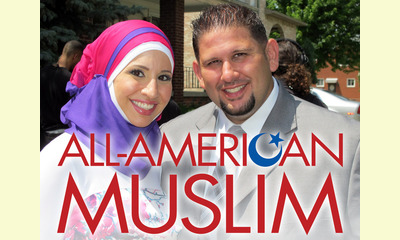|
|
Is there an ‘All-American Muslim’?
un articulo por Marwa Helal, Common Ground News Service(abbreviated)
The Learning Channel (TLC) recently aired the new reality television programme, "All-American Muslim", amid a great deal of buzz both within and outside the Muslim American community. Set in Dearborn, Michigan, a city that is well known for its large Muslim and Arab populations, the series focuses on American-born Muslims and aims to answer the question: “What is it like to be Muslim in America?”

click on photo to enlarge
America’s Muslim population is diverse in ethnicity, class and religious expression. Attending a Friday prayer or better yet, an Eid celebration showcases this diversity at its best – Turkish Americans next to Bosnian Americans, next to Bangladeshi, Malaysian, Indonesian, Indian, Pakistani, Palestinian and African Americans –the list goes on. There are those who attend mosque regularly and others who show up to socialise during the holidays.
While TLC does not claim to represent all Muslim Americans, by focusing only on American Shia Muslims of Lebanese descent living in Detroit, and with a title that claims to speak on behalf of the “All-American Muslim”, the series certainly raises the question of whether it represents the experience of Muslim Americans in general.
The choice of those Americans featured in the show reflects a desire by the producers to represent many of the issues that Muslim Americans face, such as navigating family and religious pressures when it comes to interfaith marriage, or the pros and cons of wearing the hijab (headscarf).
TLC did an excellent job of portraying equal numbers of Muslim women who wear headscarves and those who don’t – a distinction that the average American may be oblivious to. However, their choice to use Arabs for the cast has frustrated many Muslim Americans because it perpetuates the misconception that Arab is synonymous with Muslim. Many Americans may continue to miss the point that there are considerable Arab Christian and Jewish populations on the one hand, and that in fact only about a third of Muslim Americans are Arab, on the other.
Regardless of the question of representation, the cast of the show certainly makes for good entertainment value. With some strong, dynamic female characters, viewers get a closer look at the oft-misconstrued role of women in Islam. The leading women include business owners and housewives, women in headscarves, and others with tattoos . . .
The show is a potential gateway for Americans to see the stunning diversity within a faith that is often portrayed negatively in the media. Here, viewers perceive Muslims wanting the very same things that most families around the world want: for their children to grow up and be productive citizens and find good partners who make them happy, and simply to do right by each other and by their faith.
|








|
DISCUSSION
Pregunta(s) relacionada(s) al artículo :
Religion: a barrier or a way to peace?, What makes it one or the other?
* * * * *
Comentario más reciente:
I have a question for the Agape Community poster, who related experiences of rejecting white priveledge. I have certainly considered rejecting priveledge, but I have a hard time understanding where to draw the line. So much of my upbringing, who I am, what I have and so on, are a construction of the many priveledges I have grown up with. White, middle class, US citizen, female (can be considered a priveledge in some senses, male priveledge in other senses), able, assumed straight, etc. When I've looked deeply into the matter, even my basic principles have basis in my class background, and I find they are still important to me, nonetheless. Your story is inspiring and I hope you will provide some insight into the matter. It seems that many of my priveledges are powers that can be used to spread the seeds of peace, but paradoxically are the seeds of war, as you described. Is my use of them undermining the peace I want to create? ???. . ... continuación.

|
|









